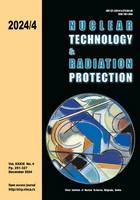
ASSESSMENT OF THE FLUX AND MONOCHROMATICITY CHARACTERISTICS OF A POLARIZED X-RAY SOURCE

Vol.
XXXIX, No. 4, Pp. 251-327
December 2024
UDC 621.039+614.876:504.06
ISSN 1451-3994
Pages: 251-260
Authors: Guili Liu, Siming Guo, Zhen Wang, Wen Li, Derong Dai, Zhiwei Li, Dongjie Hou,
Jinjie Wu, Wanchang Lai, and Zhijun YangAbstract
This paper presents an apparatus designed for the generation of polarized X-rays utilizing crystal Bragg diffraction techniques, which produces polarized X-rays energies within the range of 4-10 keV, facilitating the calibration of detection efficiency, energy resolution, polarization degree, and other parameters pertinent to polarized X-ray detectors. The apparatus comprises of a radiation source, a diffractive crystal, a rotating control mechanism, a detector and other components. High-precision generation of polarized X-rays can be achieved by diffracting through crystals with varying lattice constants at an angle of 45° using an X-ray tube and a Bragg diffraction apparatus. Monte Carlo simulations were conducted to evaluate air absorption effects on X-rays at varying energy levels, revealing an optimal measurement distance of 30 cm. Key metrics such as energy output, flux rate, energy resolution and monochromaticity for the generated polarized X-rays were evaluated through experimental measurements. The polarized X-ray flux rates were measured as: 4.135·106 m-2s-1 at 4.59 keV, 2.210·107 m-2s-1 at 6.39 keV, and 1.958·107 m-2s-1 at 10.029 keV. Monochromaticity values were: 1.48 % at 4.59 keV, 0.96 % at 6.39 keV, and 0.15 % at 10.029 keV. The apparatus is applicable to ground calibration of astronomical satellite payloads and detector development.
Key words: polarized X-ray, Bragg diffraction, monochromaticity, flux rate
FULL PAPER IN PDF FORMAT (998 KB)